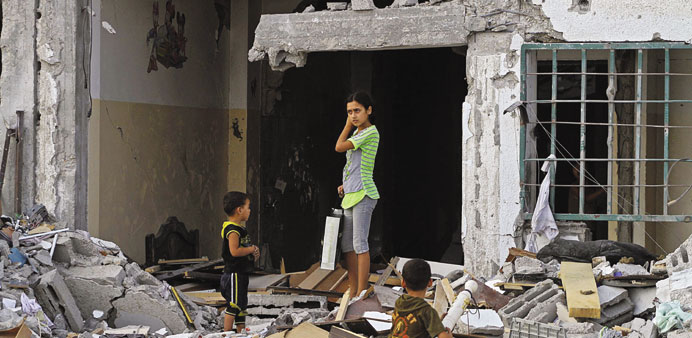Three Palestinian children standing outside a house that was destroyed during Israeli air strikes in Beit Lahiya town in the northern Gaza Strip.
Even by its usual messed-up standards, the world is a big mess: Iraq is being overrun by terrorists; Libya is disintegrating; Afghanistan stumbles to doom; Ukraine is battling Russian-supported separatists; and the Israelis and Palestinians are pausing only to reload.
Sorry to be so cheerful. In its excess, the world situation is almost absurdly bad. Has ever the world been so messed up?
Funny you should ask. Although it is little comfort to those currently imperilled, the answer is yes. In fact, the troubles of the present age are almost always no worse than the crises of the past. History, that stern old school marm, has a way of teaching perspective.
The summer of our discontent falls in August 2014. As it happens, 100 years ago this month World War I, one of the worst tragedies in human existence, was just getting underway. To mark the occasion, I have been reading The Guns of August, the 1962 classic by the historian Barbara Tuchman.
She describes the first weeks of the war, which was to drag on until 1918. Today, when we think of World War I, we think of the muddy stalemate of the trenches, but that came later. In its earliest weeks, huge armies were manoeuvreing and fighting on vast fronts.
Long before American participation, the immense scale of this new industrial-strength war - soon to produce industrial-strength casualties - was breathtaking.
The Russians massing today on Ukraine’s border? They would not have been enough to fill a sector back then. The Israelis and Palestinians battling each other in Gaza? In total, not nearly the size of the relatively small British Expeditionary Force sent to France in 1914.
History allows itself bitter little jokes. Those who fought then believed that this stupid conflict was “The War to End All Wars”.
But an obscure German soldier named Adolf Hitler didn’t take the point. Just as in Greek myth, when a dragon was killed and its teeth sowed into the ground, the terrible seeds sowed were to spring up as ferocious warriors to cause further strife. Thus did World War I lead to World War II.
All wars have unintended consequences, even those that end triumphantly for the cause of freedom - which happened with World War II, leaving the Nazis and the Japanese militarists defeated but Soviet Russia empowered.
If only righteous violence could solve all problems, life would be much easier. But the dragon’s teeth keep being sowed and the violence keeps happening. You’d think we’d learn.
Consider most of the current strife in the world. For the dismemberment of Iraq, especially, some blame President Barack Obama for indecisiveness, and he deserves his share; it goes with the job.
But to blame this president you must also blame his predecessor, He Who Must Not be Blamed (according to his apologists), for getting us into this sorry mess in the first place. Sooner or later this was bound to happen.
From the moment of the US invasion, the only uncertainty was the exact date of the eventual unravelling. Soon it will be Afghanistan’s turn.
Those who say we, the Americans, should stay in these countries have missed the point. A policy of never-ending occupation and war is not a feasible policy; it is an admission of policy failure. We could do that no more than the German armies could keep fighting in 1918.
I am no pacifist; in fact, one of my favourite memories is reading a story about a pacifist in London’s Hyde Park who kept being interrupted by a heckler, so got down from his soapbox and punched the guy in the nose.
Yes, sometimes enough’s enough. But there’s only so much we can do for allies who expect us to do most of the financing and fighting. Giving emergency help to buy time is one thing, but we can’t afford never-ending military welfare.
The current guns of August will cease eventually. Long term, we need to challenge the idea that every problem can be solved by military action when war always seems to beget more of the same. What we need is to dust off the “just war” theory expounded by Saint Augustine and others and treat war as a matter of last resort.
What we have now is the notion that war is a problem-solver of first resort, just as the kaiser once believed.
It seems that in 100 years we have learned nothing.
*Reg Henrymay be contacted at [email protected].

